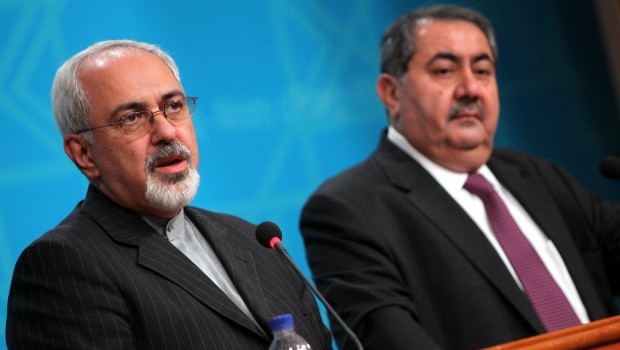
Iranian foreign minister Mohamad Javad Zarif (L) speaks during a joint press conference with his Iraqi counterpart, Hoshyar Zebari, in Baghdad on September 8, 2013. (AFP PHOTO/POOL/AHMAD AL-RUBAYE)
After intensive talks with a number of senior Iraqi officials, including Iraqi prime minister Nuri Al-Maliki and foreign minister Hoshyar Zebari, Zarif emphasized Iran’s hopes for a peaceful solution to the ongoing crisis in Syria and criticized US plans for a punitive military strike against the Syrian government.
He also stressed the importance Tehran placed on its relations with Iraq.
Zarif said: “Our talks in Baghdad revolved around bilateral issues and the dangerous circumstances in the region.” He added that “dedicating our first official international visit to Iraq is an indication of the importance of relations with neighbors, especially Iraq, to Iran and its current government under the presidency of Hassan Rouhani.”
The Iraqi foreign minister said that discussions with his Iranian counterpart had focused on “the importance of developing bilateral relations at all levels in a way that serves the interests of both people and strengthens security and stability in the region.” Zebari called for “more cooperation to confront the challenges in the region, especially extremism, terrorism and sectarian incitement.”
Maliki, meanwhile, said in a statement issued by his office that “sectarianism is no less dangerous than chemical weapons,” stressing “Iraq’s stance, which calls for a political solution to the Syria crisis, which is becoming more complicated because of foreign interference.” He added that “finding a political solution is in the interest of all internal and regional parties.”
Mariam Al-Rayyis, Maliki’s political affairs advisor, told Asharq Al-Awsat that “the most important part of the Iranian foreign minister’s visit is stressing the importance of a peaceful stance on Syria and the region as a whole, especially since the Iranian leadership feels that US president Barack Obama has no desire to launch a strike, a fact that can be exploited to unify the two countries’ stances in that direction.” She added that “Zarif said Iran would not cause harm to Iraq by targeting American interests in Iraq during the strike.”
Maliki’s advisor said: “The Iranian official sees the Iraqi stance regarding the Syrian conflict as responsible, and therefore Iran would not harm Iraqi sovereignty.” She added that “Iraq is host to 200,000 Syrian refugees and the number may increase if a strike were to take place, which makes Iraq an interested party.”
During a news conference with his Iranian counterpart, the Iraqi foreign minister said that “through my visits to Washington and Europe, I found that some states favored a strike on Syria but felt there was hesitation,” adding that “we are doing all we can to reach a peaceful solution to the Syrian crisis, because launching a strike on Syria will have a humanitarian and security effects on Iraq and other regional states.”
The Iranian foreign minister said that “the region is going through sensitive circumstances that require cooperation between all regional states, not just Iraq and Iran, and therefore we must work to avert a bloody war in Syria because its repercussions would affect all the region’s states.” He called on all parties to the Syrian conflict to resort to dialogue and negotiations to resolve the crisis, and on other parties to avoid the use of force.
The speaker of Iraq’s parliament, Osama Al-Nujaifi, warned of the repercussions to Iraq of an American strike on Syria in a news conference on Sunday, adding that it was important for the “Iraqi political discourse to be unified to ensure that no internal consequences affect Iraq should Syria be subjected to a military strike.”
The parliament’s Foreign Relations Committee said: “Iraq, through its clear stance on the Syrian crisis, has proved that it was not affiliated to any of the parties of the Syrian conflict and that all it desired was to ensure internal unity and protect it against external challenges.”
Safiyah Suhail, a member of the Foreign Relations Committee, told Asharq Al-Awsat that “Iraq is one the countries most concerned with the Syrian crisis for many internal and regional considerations.”
